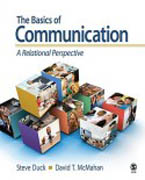
The basics of communication: a relational perspective
Duck, Steve
McMahan, David T.
"Basics of Communication" is the first introductory communication textbook toexplore fundamental communication concepts, theories, skills, and contexts with a thematic integration - the relational perspective. The book's approach isto make the topics covered - self-development, interpersonal communication, group communication, public speaking, media/technology, etc. - coalesce by exploring the relational basis of all communication as a major feature of students' lives.This text provides a basic introduction to the usual topics, but does so in a number of different ways by emphasizing the importance of relationshipcontexts in the enactment of social life. The authors explore the ways relationships (between each other, between family members, between media and end-user or consumer) affect communication, and vice versa. The underlying theme of relationships usefully connects many aspects of a basic text that will give it a coherence and a relevance to students that has been previously missing, obscure, or under emphasized. INDICE: 1. An Overview of Everyday Communication What Is Communication Anyway? Properties and Effects of Communication Conclusion: Communication Is... 2. Verbal Communication How You Know What Talk Means Everyday Life Talk and theRelationships Context Ways of Speaking 3. Nonverbal Communication What Is Nonverbal Communication? How Does Nonverbal Communication Work? What Are the Functions of Nonverbal Communication? What Are the Elements of Nonverbal Communication? The Interacting System of Nonverbal Communication Improving Your Use of Nonverbal Communication 4. Listening The Importance of Listening in Everyday Communication Listening Objectives The Process of Active Listening Engaged and Relational Listening Recognizing and Overcoming Listening Obstacles Critical Listening 5. Self and Identity Who Are You? Identity as Inner Core: The Self-Concept Identity and Other People Transacting a Self in Interactions With Others6. Talk and Interpersonal Relationships Talk, Relationships, and Knowledge Composing Relationships Through Talk Stages in Relationship Development Coming Apart So Are There Stages in Relationship Development or Not? 7. Small-Group Relationships, Leadership, and Decision Making What Makes a Collective or an Assembly Into a Group? Features of Groups Leadership Group Decision Making Group Decision Making Is About Relationships 8. Society, Culture, and Communication Thinking About Culture Structure-Based Cultural Characteristics Defining and Performing Membership of a Culture Communication and Culture Relationships as Culture 9. Technology in Everyday Life Examining Technology Relational Technology and the Construction of Identities Online Activity and the Construction of Identities Relational Technology and Personal Relationships Online Communication and Personal Relationships The Media Equation 10. Relational Uses and Understanding of Media Early Views of the "Mass" Media Audience The Active Use of Media Relational Uses and Functions of Media The Use of Media in Everyday Communication 11. Preparing for a Public Presentation Analyzing Your Audience Selecting Your Topic Determining the Purpose and Thesis of Your Presentation Including Evidence and Support Material Selecting and Using Evidence and Support Material Selecting Sources Using Presentation Aids 12. Developing a Public Presentation The Body: Developing Your Argument Introductions and Conclusions 13. Relating Through Informative Speeches and Persuasive Speeches Informative Speeches Persuasive Speeches 14. Delivering a Public Presentation Three Guidelines for Effective Delivery Styles of Delivery Goals of Effective Delivery Components of Effective Delivery Managing Communication Apprehension.
- ISBN: 978-1-4129-4153-2
- Editorial: Sage
- Encuadernacion: Rústica
- Páginas: 416
- Fecha Publicación: 01/10/2009
- Nº Volúmenes: 1
- Idioma: Inglés
